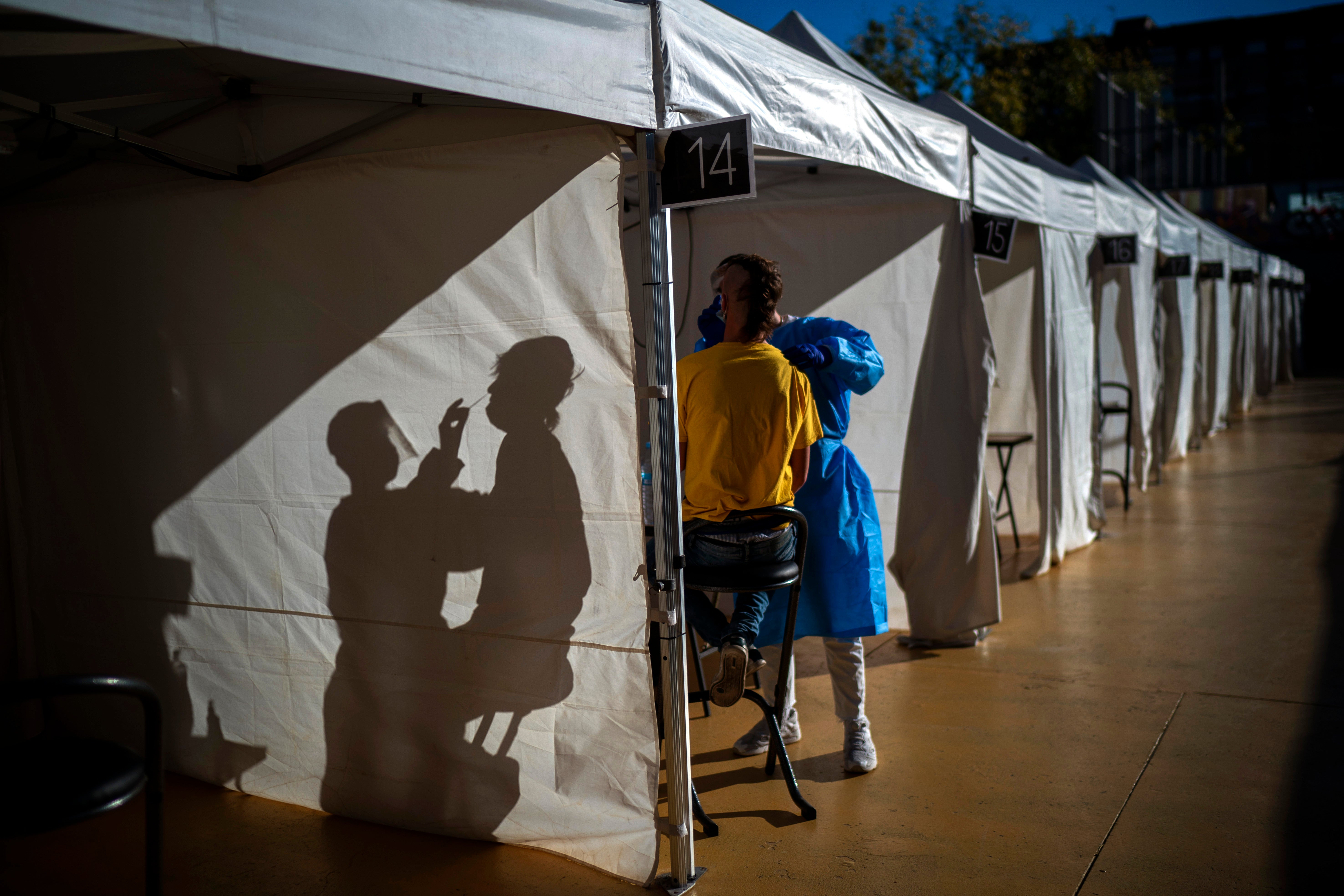Barcelona concert tests use of same-day COVID-19 screening
Five hundred music fans eager for a live show without social distancing are volunteering to test the effectiveness of same-day coronavirus screening at a concert in Barcelona

Your support helps us to tell the story
From reproductive rights to climate change to Big Tech, The Independent is on the ground when the story is developing. Whether it's investigating the financials of Elon Musk's pro-Trump PAC or producing our latest documentary, 'The A Word', which shines a light on the American women fighting for reproductive rights, we know how important it is to parse out the facts from the messaging.
At such a critical moment in US history, we need reporters on the ground. Your donation allows us to keep sending journalists to speak to both sides of the story.
The Independent is trusted by Americans across the entire political spectrum. And unlike many other quality news outlets, we choose not to lock Americans out of our reporting and analysis with paywalls. We believe quality journalism should be available to everyone, paid for by those who can afford it.
Your support makes all the difference.Eager for a live music show after months of social distancing, more than 1,000 Barcelona residents gathered Saturday to participate in a medical study to evaluate the effectiveness of same-day coronavirus screening to safely hold cultural events.
After passing an antigen screening, 500 of the volunteers were randomly selected to enjoy a free concert inside Barcelona’s Apolo Theater.
The other 500 who didn't get selected were sent home. They will form a control group that will allow the organizers to analyze if there was any contagion inside the concert hall despite the screening with antigen tests, which while not as accurate as other types of tests, do produce results in 15 minutes as compared to several hours, or days, later.
Carolina Rius was one music lover willing to accept the risk of mingling among a large group of people indoors so she could finally experience a concert without having to remain seated and two meters apart as currently dictated by health authorities.
“I really, really missed going to concerts, above all to hear some rock ’n’ roll,” the 56-year-old Rius said. “I don’t feel like a guinea pig. I feel like I am taking a stand. The world of culture, and above all the concert halls, are having a very bad time of it and I don’t want them to shut for good.
“And if they end up choosing me in the draw to go to a concert, that will be the cherry on top.”
The study is organized by Barcelona's The Fight AIDS and Infectious Diseases Foundation along with the Primavera Sound music festival. The study was given the go-ahead by the regional authorities in northeast Catalonia.
“This is not a party, this is a scientific study,” Dr. Boris Revollo, the virologist who designed the study’s protocols, told The Associated Press. He insisted that the use of same-day antigen screening for large events wasn't a substitute for face masks and other sanitation rules, but he believed it could be a powerful tool to help make large events safe enough until vaccines are widespread enough to beat back COVID-19.
“This could be useful in all types of events, from cultural events, to business congresses, to sporting events,” Revollo said. “And young people, as we have seen, are holding their own clandestine parties because they have no other outlet.”
The 500 allowed into the five-hour music festival of rock groups and disc jockeys must wear FFP2 face masks and hand disinfectant. Social distancing, however, on the concert floor wasn't to be enforced in an attempt to get as close as possible to a real concert atmosphere. Organizers said they will also keep a close watch on the designated areas for drinking to ensure that they don't become a hotspot of trouble.
All 1,000 of the volunteers will also undergo two PCR tests, which have a higher capacity to detect the virus than the same-day antigen test, first on Saturday before the concert, and then again eight days later. Revollo said these PCR tests will allow him and his fellow investigators to determine if any infected people got past the same-day antigen screen and, if so, did they infect others inside the show.
Spain is still under limited restrictions for the pandemic that has killed a confirmed 47,600 residents.
Concert halls have been one of the hardest hit sectors by the health restrictions applied in Spain, twice being completely shut down for several months. In November, an association representing concert halls in Spain said that more than 25,000 shows had been canceled because of the pandemic, costing the industry 120 million euros ($145 million) in lost revenue. Halls were only recently allowed to reopen in Barcelona but at 50% capacity or a maximum of 500 people.
Epidemiologist Joan Caylà, who has no connection to the study, said that while “vaccines are still far off” before they reach everyone, even the successful use of antigen testing wouldn't eliminate the need to keep events small and highly controlled.
“It is very important that those attending the event act responsibly,” Caylà said. “A certain risk of causing an outbreak exists.”
___
Follow AP’s coverage at https://apnews.com/hub/coronavirus-pandemic and https://apnews.com/UnderstandingtheOutbreak